Being mocked, having his shorts pulled down and getting tripped during training or races – is nothing new to 31-year-old civil servant, Edmund Sim.
This is because Edmund does racewalking – a sport, which blurs the line between power walking and running. And to some, racewalking may “seem funny.” So Edmund sometimes gets mocked and taunted. But this has made the walker more determined than ever, to succeed in his passion.
His racewalking achievements include setting a national record of 1 hour 36 minutes and 1 second at the 2012 Asian 20km Racewalking Championships in Japan. Earlier this year, he represented Singapore again, in the same event, and came in tenth, with a timing of 1 hour, 36 minutes and 58 seconds.
I interviewed Edmund and asked him about the intriguing sport of racewalking.
Here is what the racewalker said.
Edmund, what are some of the main differences between racewalking and running?
Racewalkers are bounded by two rules, in the progression of steps taken. These are as follows:
- One foot must be in contact with the ground at all times.
- The advancing leg must be straightened upon contact until it reaches underneath the body.
As compared to running, racewalking is both physically and technically demanding. Besides accumulating mileage like a distance runner, we also spend quite a fair bit of time on our technique.
What got you started in doing racewalking?
I came into racewalking by chance.
Whitley Secondary School includes the 1200m Walk in its annual athletic meet to encourage mass participation.
In 1997, when I was in Sec 2 at Whitley, I didn’t want to take part in my school’s sports day because I was “lazy to run”. So one of the PE teachers told me: “we have an event which caters for people like you, it’s called walking.” I signed up and struggled, but was lucky to win the race. I also missed the school record by one second. From there, I didn’t look back.
Why do you do racewalking and not running?
It’s simply passion and the love for it.
I have tried many other sports but they do not give me the same satisfaction that racewalking does. It is also good for character building.
What are your personal bests in your races so far? And which category do you specialise in?
My personal bests are as follows:
- 5km Walk – 21:50min
- 10km Walk – 45:55min
- 20km Walk – 1hr36:01min
- 50km Walk – 5hr18:07min.
In walk, we don’t really have a specialty. Personally, I would prefer the 50km event, though I have done only two 50Km races in my life.
What are some of the biggest challenges in your racewalking career so far?
People often mock us during training and races. I had people pulling down my shorts, calling me “girly”, tripping me on purpose and so on. In my earlier years, I would get angry and retaliate. After a while, I realized that fighting is pointless. How many people can I argue with?
Political struggles are also part and parcel of this event. It is common to be entangled in bureaucratic battles. In the past, I was left out of many competition opportunities despite winning races and trials. The reasons were weird, ranging from, “the plane is not comfortable enough to travel” to “the place is too far” and “you must break the Olympic mark before we can consider you (while athletes outside the walk event did not have this restriction).” These reasons were absurd, but I had to accept them and find a compromise.
Along the way, I was lucky to receive help from my schools. Ngee Ann Polytechnic gave me a scholarship and UniSIM funded my trip to the World University Games.
Money takes the centre stage in all undertakings. Each year, I have to fork out at least $1000 on shoes. For competitions where subsidies are not available, I have to foot the bills. In 2013, I spent $10,000 of my own money (on training camps, overseas meets and equipment), trying to qualifying for the SEA Games, which I failed.
Being away for training and competitions also means less time for social life. So I have to come up with a sound time management plan.
What is the main motivating factor that keeps you going?
It’s the love for the sport and the desire to walk faster. On top of that, I hope to achieve social acceptance for this event. However, being a lesser-known athlete means I have limited influence. The best way would be to score good results and share my experiences with others. I also hope to raise the awareness that it is possible to pursue a dream with determination and more importantly a sincere effort in the face of challenges.
Can you share with us, your proudest moment in racewalking?
It would be the 2012 IAAF World Racewalking Cup in Russia, where I had the opportunity to compete with the best in the world.
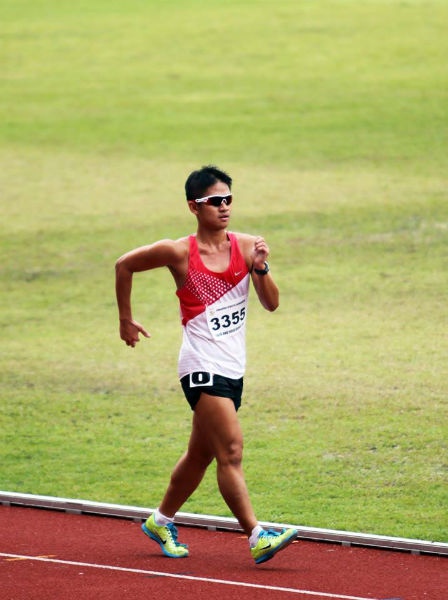
Edmund Sim at 2013 SAA Track and Field, Series 4. (Credit: Khoo Yuan Zhi, https://www.facebook.com/XYZPhoto)
Any comments on your goal to qualify for the 2015 SEA Games?
The main obstacle will be myself – the fear of not being able to make it and recovering from bad spells. I will have to dig deep for solutions and motivation.
Why don’t people hear much about race walking, as compared to running?
Running is popular because there are many good events generating interest. When there is hype, it stirs enthusiasm among people.
After the New Paper Big Walk days, we do not have any event with the same marketing efforts seen in our running races. Without a good event, there is no incentive for anyone to find out more, let alone train for it.
When and what is your next upcoming racewalking competition?
I will be going to China in May for the International Association of Athletics Federations (IAAF) World Racewalking Cup. I hope to get close to the 2013 SEA Games bronze mark of 1hr36min18sec for the 20km Walk.
After that, I will look for a 50km race. In December, I hope to go for training camp in Africa.
How would you advise someone who may be interested to take up racewalking?
Be patient and humble in training. Stay hungry and keep learning.
An IAAF official once told me that the technique is like your qualification. It is yours forever. No one can take it away.
Any tips for potential race walkers?
Learn to appreciate the sport and love what you do. Aspire to enjoy (instead of being the best) and the results will come.
Other Blog Posts
Click here to read about Joan Liew, Singapore’s top female bodybuilder.
Click here to read about Jason Chee, who suffered a horrifying navy accident in 2012, but is now an inspirational figure in Singapore.
Click here for tips on prevention and treatment of running injuries, from a specialist sports physician.
Click here for tips on night running, from one of Singapore’s top runners.

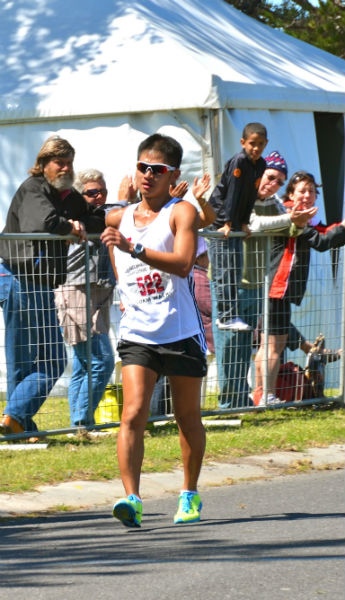
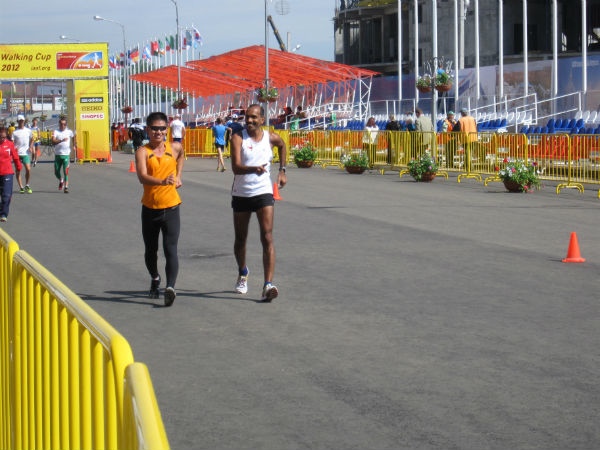
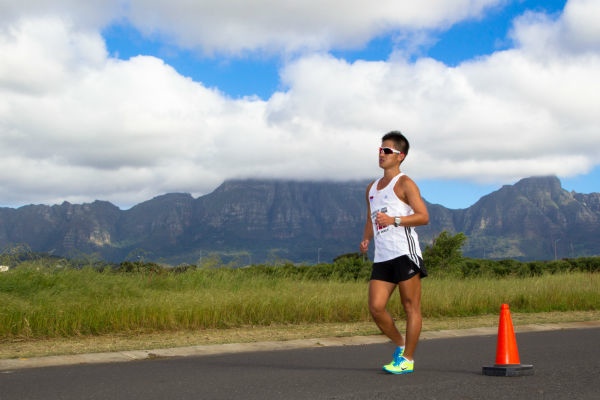
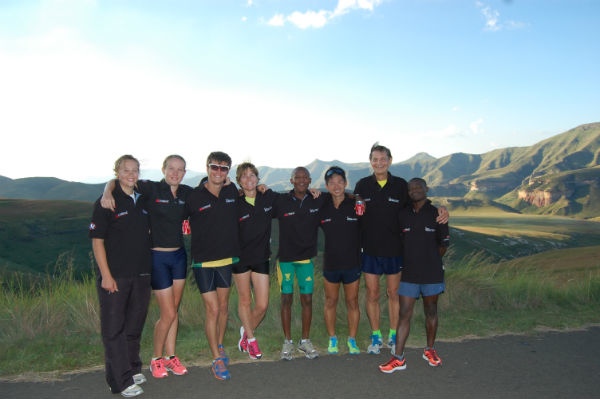
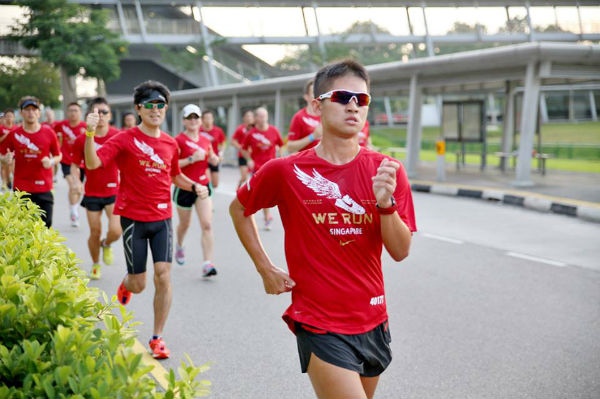
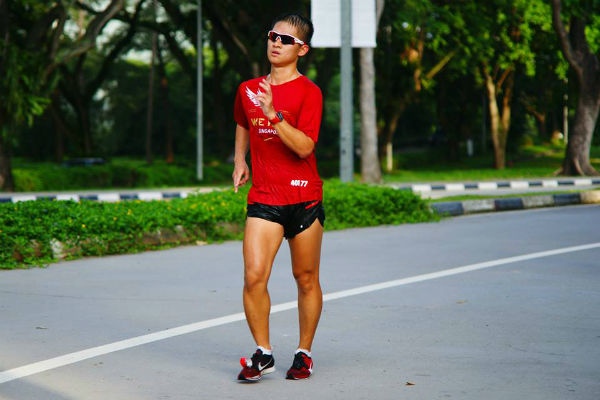
Leave a Comment